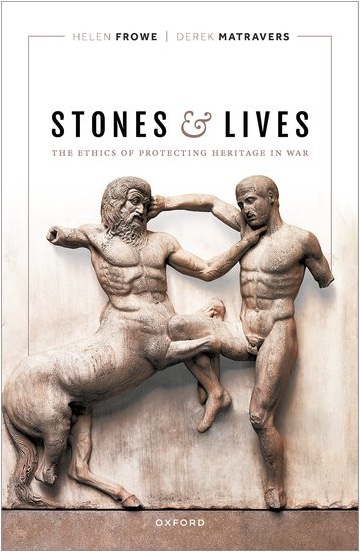New Publication: Stones and Lives: The Ethics of Protecting Heritage in War (OUP, 2024)

Another output from our Heritage and War project, Stones and Lives defends an account of what may be done to protect cultural property during armed conflict. It argues that the moral constraints on risking harm to persons significantly limit the risks that may be imposed on both combatants and civilians for the sake of reducing risks to heritage. This challenges both current international laws on heritage protection and the heritage protection policies of various armed forces.
New Publication: Heritage in War: Ethical Issues (OUP, 2023)

Part of our Heritage in War project, this edited collection offers philosophical discussions on a range of ethical questions connected to the protection of heritage in war. Contributors are Helen Frowe and Derek Matravers, Joshua Thomas and William Bülow, Victor Tadros, Nancy Sherman, Robert Hopkins, Bashshar Haydar, Dale Dorsey, Carolyn Korsmeyer, Tuukka Kaikkonen and Cian O’Driscoll, and Penelope Bernard and Simon Kirchin.
New Symposium on Victor Tadros’ To Do, To Die, To Reason Why (Mind)
This symposium appears in Mind (2023), guest edited by Helen Frowe. The papers for were originally presented at a joint workshop on Victor Tadros’ To Do, To Die, To Reason Why: Individual Ethics in War (OUP, 2020), co-hosted by Princeton University and the Stockholm Centre for the Ethics of War and Peace, Stockholm University, co-sponsored by the Society for Applied Philosophy, Princeton University and the Knut and Alice Wallenberg Foundation.
Find out more details, including links to all articles, on our symposium page.
Heritage and War: Ethical Issues – a new collection of essays

The Stockholm Centre is part of an ongoing collaborative project on the protection of cultural heritage in war, led by Professor Derek Matravers of the Open University and Professor Helen Frowe.
Findings of the project are published, among other places, in Heritage and War: Ethical Issues (Oxford, Oxford University Press), a volume edited by William Bülow, Helen Frowe, Derek Matravers, and Joshua Lewis Thomas. This collection of original essays provides a range of theoretical perspectives on the destruction and protection of cultural heritage while challenging existing views. The volume also serves as an introduction to the current state of the debate and explores ways of developing the discussion.
More information on the book can be found here.
More information on the research project may be found here.
CFP: 8th Annual Graduate and Early Career Workshop (Online)
Call for Papers: 8th Annual Graduate and Early Career Workshop (Online)
Stockholm Centre for the Ethics of War and Peace
26th‑27th October 2023, via Zoom
Deadline for submissions: 1st June 2023
The Stockholm Centre for the Ethics of War and Peace is pleased to announce its 8th Annual Graduate and Early Career Workshop. We invite submissions from current and recent graduate students (within two years of receiving their PhD). Papers should address philosophical issues relating to the ethics of war and peace, broadly construed. This includes, for example, papers on causation, responsibility, authority, partiality, scarcity of resources, collective action, punishment, and self-defence. The Stockholm Centre currently has a particular interest in ethical issues connected to migration and refuge.
Each successful applicant will be allocated a faculty respondent who will provide written comments on the paper and serve as a commentator at the retreat. In order to find the most suitable respondents, faculty will be invited after papers have been selected. Past respondents have included Helen Beebee, Yitzak Benbaji, Garret Cullity, Christopher Finlay, Helen Frowe, Adil Haque, Kimberly Kessler Ferzan, Holly Lawford-Smith, Seth Lazar, Kasper Lippert-Rasmussen, Kieran Oberman, Massimo Renzo, David Rodin, Adam Slavny and Laura Valentini.
Papers should be no longer than 8000 words, including notes, and prepared for blind review. Papers should not have been accepted for publication or given revise and resubmit verdicts at the time of submission. Submissions from graduate students should include a letter from their department confirming their year of study. Submissions from early career researchers should include confirmation that they are within two years of receiving their PhD (e.g., a letter from an examiner or supervisor, or a copy of their PhD certificate). Submissions and enquiries should be sent to [email protected] (subject line: “SUBMISSION Annual Workshop”).
Website:
https://stockholmcentre.org/event/cfp-8th-annual-graduate-and-early-career-workshop-online/
Workshop on Deterrence
CFP: Workshop on Deterrence
Lake Bled, Slovenia
19-20 June 2023
Deadline for submissions: 25th of March 2023
Debates about whether and how third party states ought to respond to Russia’s invasion of Ukraine frequently invoke the importance of deterring further (Russian) aggression. It seems widely accepted, at least in the public and political discourse, that deterring aggression is a just cause for war. And yet there is scant discussion of deterrence as a just cause for force in either the philosophical literature on the ethics of war or the broader literature on defensive harming. There is also a surprising lack of engagement by those working on the ethics of war with the substantial literature on nuclear deterrence.
This workshop will explore how work on deterrence across legal, moral and political philosophy (for example, in relation to punishment, political policies, coercion, and nuclear deterrence) might shed light on the ethics of war. It will combine the discussion of relevant published work with the presentation of new research. Confirmed participants thus far include Helen Frowe, Victor Tadros, Jonathan Parry, Attila Mráz, Nadine Elzein, Patrick Tomlin and Massimo Renzo.
Call for Papers:
Those wishing to present new research should submit papers of no more than 5000 words, suitable for a 40 minute presentation. Papers need not explicitly address the idea of deterrence as a just cause for force. Authors should indicate whether they would also like to participate in the workshop if their paper is not selected for presentation. Participants, including authors, will need to cover their own travel expenses; the Stockholm Centre will cover accommodation for three nights and refreshments / lunches during the workshop for all participants. All participants are expected to attend the whole workshop. Submissions should be emailed to [email protected] (inquiries can also be directed to Helen). The deadline for submissions is the 25th of March 2023.
The workshop will take place at Lovec Hotel, Bled.
7th Annual Graduate and Early Career Reading Retreat (Online) Call for Papers
7th Annual Graduate and Early Career Reading Retreat (Online)
Stockholm Centre for the Ethics of War and Peace
15-16 June, 2022, via Zoom
Deadline for submissions: 1 April, 2022
The Stockholm Centre is pleased to announce its 7th Annual Reading Retreat. We invite submissions from current and recent graduate students (within two years of receiving their PhD). Papers should address philosophical issues relating to the ethics of war and peace, broadly construed. This includes, for example, papers on causation, responsibility, authority, partiality, scarcity of resources, collective action, punishment, and self-defence. At this time, the Stockholm Centre has a particular interest in papers on migration, refugees, and rights.
Each successful applicant will be allocated a faculty respondent, who will provide written comments on the paper and serve as a commentator at the retreat. In order to find the most suitable respondents, faculty will be invited after papers have been selected. Past respondents have included Kimberly Kessler Ferzan, Adam Slavny, Helen Beebee, Yitzak Benbaji, Garret Cullity, Christopher Finlay, Helen Frowe, Adil Haque, Holly Lawford-Smith, Seth Lazar, Kasper Lippert-Rasmussen, Kieran Oberman, Massimo Renzo, David Rodin, and Laura Valentini.
Papers should be no longer than 8000 words, including notes, and prepared for blind review. Papers should not have been accepted for publication or given revise and resubmit verdicts at the time of submission. Submissions from graduate students should include a letter from their department confirming their year of study. Submissions from early career researchers should include confirmation that they are within two years of receiving their PhD (e.g. letter from examiner or supervisor, or a copy of their PhD certificate). Submissions and enquiries should be sent to [email protected].
Forthcoming SCEWP chapters in Oxford Studies in Political Philosophy
Joseph Bowen (SCEWP postdoc) and Lisa Hecht (former SCEWP doctoral researcher, and now Affiliated Research and postdoctoral researcher at Stockholm University) both have chapters in the forthcoming volume of Oxford Studies in Political Philosophy, edited by David Sobel and Steven Wall.
Lisa’s paper is called ‘Permissible Rights Infringements, Benefits and Compensation’. Joseph’s paper is called ‘Humanitarian Intervention, Other-Defense, and Consent’, and featured at SCEWP’s 3rd Annual Graduate Reading Retreat in 2016.
New Symposium on Moral Responsibility and Liability to Defensive Harm at Philosophical Studies.
This symposium appears in the Philosophical Studies, guest edited by Helen Frowe and Massimo Renzo (volume 178. issue 11). It follows as a result of the ‘Conversations on War’ project, co-organsed by SCEWP and the Kings College, London’s Yeoh Tiong Lay Centre for Politics, Philosophy, and Law. The Conversations on War project explores how philosophers working on the ethics of war can draw on research in other areas of philosophy to improve our accounts of harming in war and how research on the ethics of war might challenge or illuminate work in those other areas.
Find out more on our journal symposium page here, including links to all the articles.


